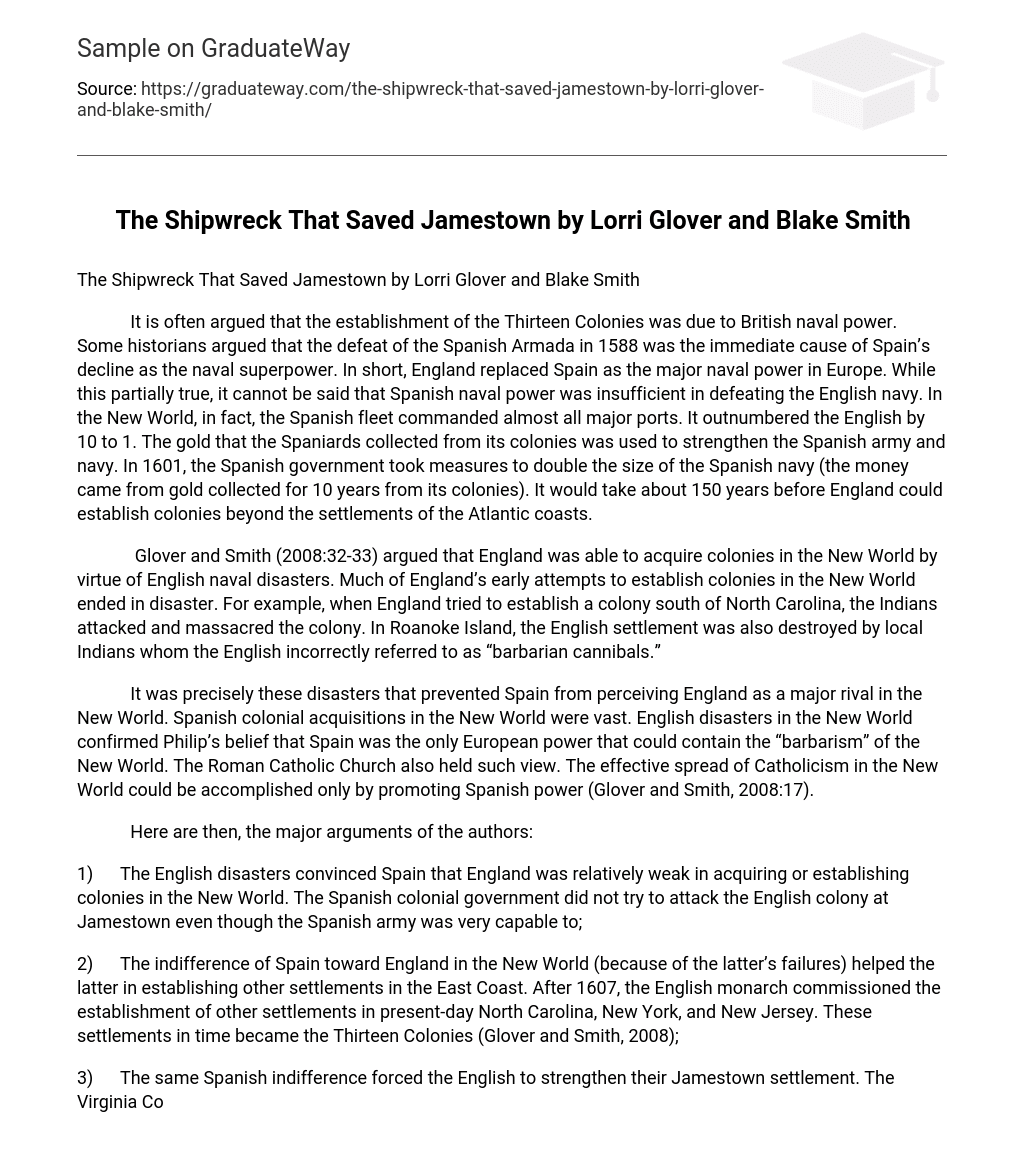It is often argued that the establishment of the Thirteen Colonies was due to British naval power. Some historians argued that the defeat of the Spanish Armada in 1588 was the immediate cause of Spain’s decline as the naval superpower. In short, England replaced Spain as the major naval power in Europe. While this partially true, it cannot be said that Spanish naval power was insufficient in defeating the English navy. In the New World, in fact, the Spanish fleet commanded almost all major ports. It outnumbered the English by 10 to 1. The gold that the Spaniards collected from its colonies was used to strengthen the Spanish army and navy. In 1601, the Spanish government took measures to double the size of the Spanish navy (the money came from gold collected for 10 years from its colonies). It would take about 150 years before England could establish colonies beyond the settlements of the Atlantic coasts.
Glover and Smith (2008:32-33) argued that England was able to acquire colonies in the New World by virtue of English naval disasters. Much of England’s early attempts to establish colonies in the New World ended in disaster. For example, when England tried to establish a colony south of North Carolina, the Indians attacked and massacred the colony. In Roanoke Island, the English settlement was also destroyed by local Indians whom the English incorrectly referred to as “barbarian cannibals.”
It was precisely these disasters that prevented Spain from perceiving England as a major rival in the New World. Spanish colonial acquisitions in the New World were vast. English disasters in the New World confirmed Philip’s belief that Spain was the only European power that could contain the “barbarism” of the New World. The Roman Catholic Church also held such view. The effective spread of Catholicism in the New World could be accomplished only by promoting Spanish power (Glover and Smith, 2008:17).
Here are then, the major arguments of the authors:
1) The English disasters convinced Spain that England was relatively weak in acquiring or establishing colonies in the New World. The Spanish colonial government did not try to attack the English colony at Jamestown even though the Spanish army was very capable to;
2) The indifference of Spain toward England in the New World (because of the latter’s failures) helped the latter in establishing other settlements in the East Coast. After 1607, the English monarch commissioned the establishment of other settlements in present-day North Carolina, New York, and New Jersey. These settlements in time became the Thirteen Colonies (Glover and Smith, 2008);
3) The same Spanish indifference forced the English to strengthen their Jamestown settlement. The Virginia Company which governed the settlement was able to bide more time to resupply the colony and saved it from relentless Indian attacks.
Supporting Historical Data
In 1608, the Virginia Company censored all letters coming from the Jamestown settlement. The colonial council wanted to create a “good” image of the settlement in order to attract investors (Glover and Smith, 2008:229). The “propaganda” of the colonial council even pushed the English monarch to commission the establishment of more colonies. In the following year, the Virginia Company launched a public relations campaign in London. The objective of the campaign was to tie the fate of the Virginia colony to England’s colonial power. The English public accepted the “resolution” without haste and demanded the strengthening of the Virginia colony. In the same year, the Company sent a flotilla of seven ships led by the Sea Venture to resupply the colony (Glover and Smith, 2008:122).
The flotilla though was almost destroyed when it came into contact with a hurricane off Bermuda. The Sea Venture was reported to have been destroyed. In England, the Virginia Company began contemplating of abandoning the colony at Jamestown. However, the missing ship had not sunk. It wandered around Bermuda and landed in an unknown island. The survivors survived for almost a year. The Sea Venture finally reached Jamestown, an almost dead colony (Glover and Smith, 2008: 125-126). The colonial officials convinced Gates (the captain of the ship) to abandon the colony. But as the ship was leaving the settlement, a fleet arrived, recently commissioned by the Virginia Company. It was sensational. The colony was saved and English power in the New World was reestablished.
Although the book main arguments are generally of historical sense, here are some of the major contentions:
1) Spain decided not to attack England not only because of the latter’s misfortune but also because the settlements in Jamestown and New Amsterdam did not offer economic values;
2) Goldmines never existed in those English colonies. For the Spaniards, colonies without gold mines were doomed to existence. Spanish settlements in the New World was located in areas with considerable number of potential gold mines;
3) And, the Spanish colony in Florida, as many Spanish colonial officials perceived, held the key to future Spanish fortunes in the East Coast. Hence, no Spanish attack was made against English colonies at Jamestown and New Amsterdam.
Weighing the pros and cons of the book’s main thesis, it can be argued that Spanish indifference to the English in the New World was due partly to the misfortunes of the latter and Spanish perception of a “good” colony. In any case, the English were able to establish their colonial power in North America without too much pressure from the Spaniards.
Reference
Glover, Lorri and Daniel Blake Smith. 2008. The Shipwreck That Saved Jamestown. New York: Henry Holt and Company.





